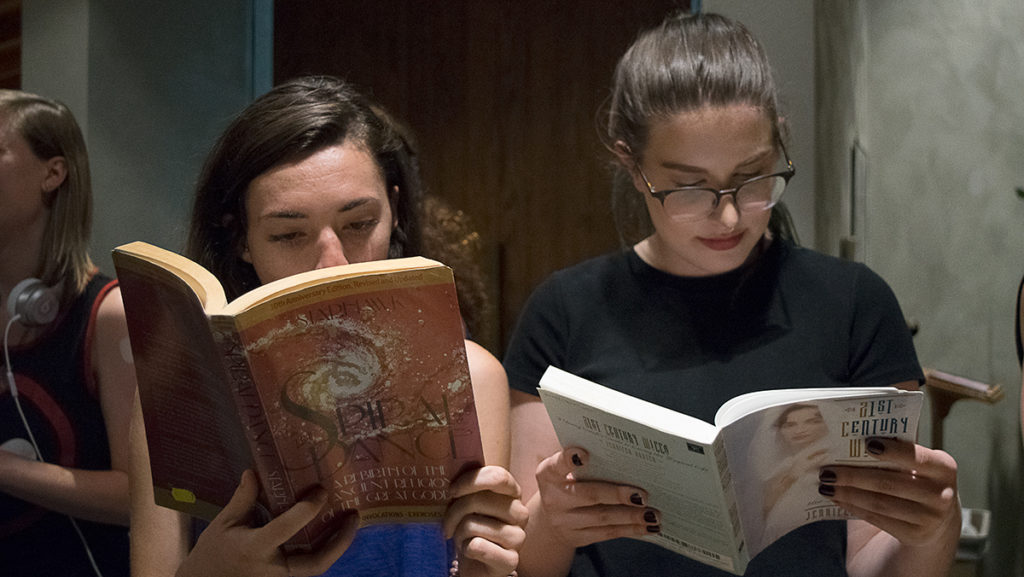“It’s good for concentration and luck,” senior Raquel Belkin said as she pulled a citrine stone out of her jacket pocket. The crystal, rugged and foggy-white at the bottom, tapers off to a polished point as its color fades to a rich burnt-orange. “It has just a very happy energy.”
Collecting stones and believing in their metaphysical powers and energies is not atypical for those who practice earth-based religions. Natural items hold significance for many who identify as pagans.
Belkin is a part-time writing student at Ithaca College and the president of the IC Pagan Community. She founded the organization with Bronwyn Bishop ’16 in Spring 2015, and the club became recognized as an official organization through the Office of Student Engagement and Multicultural Affairs the following fall.
“It was something I’ve always wanted to have — a community of other pagans to work with and worship with, to learn from them and hopefully do some teaching, too,” Belkin said. “It’s kind of lonely practicing a religion by yourself.”
Shanddaramon, a Bostonian author who focuses on paganism, said the religion is surrounded by a number of misconceptions, despite its growing popularity.
“Modern paganism is spreading throughout the world and has been listed as one of the fastest growing modern religious movements, yet it is also one of the most misunderstood,” he stated in his book “Paganism: A Religion for the 21st Century.”
Though paganism has a relatively small following, according to the U.S. Census bureau, it is growing in the United States. In 1990, 140,000 people identified as pagan and 134,000 as Wiccan. In 2008, those numbers increased to 340,000 and 342,000, respectively. The Oxford English Dictionary defines a pagan as a follower of a pantheistic or nature-worshipping religion.

In describing the religion, Belkin said paganism is an umbrella term for a number of different earth-based systems of belief. She practices Wicca, a contemporary form of paganism that observes seasonal and life cycles in nature and celebrates magic and male and female deities, according to Merriam-Webster. For Belkin, the concept of duality has been significant, as she also practices Judaism.
Though she was raised in a Jewish family, she said she found a book on Wicca during a period when she did not identify with Judaism.
“I was kind of looking for something to fill that spiritual void, and I found something that fit me really well, and even when I found Judaism again, I kept Wicca because it was just as much a part of me at that point,” she said.
In addition to Wicca, some other forms of paganism include neo-paganism, based in ancient polytheistic religions of Europe and the Middle East; Hellenic paganism, based in Greek mythology; and Norse paganism, a type of Germanic neo-paganism.
Many events that the community holds coincide with pagan seasonal celebrations in what it calls “The Wheel of the Year.” The October holiday of Samhain has similarities to Halloween in that during this harvest celebration, pagans believe the veil between life and death is close. To celebrate Samhain this year, sophomore Margot Register said, members of the community met to remember deceased loved ones and make leaf crowns.
Another event the pagan community held at the beginning of the fall semester was “Ask a Witch,” where students were invited to ask the group questions about paganism. She said all of their events are open to those who want to learn more about it.
Register is the group’s vice president and is in charge of managing social media, note-taking at meetings and helping with organizing events. She defines herself as an interfaith pagan, based on her upbringing in Lancaster, Pennsylvania.
“When I was younger, our family just called ourselves interfaith,” she said. “We were sort of a secular family, but we grew up in a religious area, so it was helpful for us to sort of have a title. So I like to carry that title on because I find aspects of other religions in my own.”
Senior Bethany Rock is an active member of the community and also a Wiccan. Because Wiccans emphasize the power of duality, some of them acknowledge both a goddess and a god. Like Belkin, Rock said she makes her practice her own based on mainstream religious beliefs with which she was raised.
“I went to a Catholic elementary school for a long time, and one of the best things about paganism is there’s no right or wrong answer,” she said. “So when I picture the goddess, I still picture the Virgin Mary. … That’s just what I was raised to picture.”
Rock said she pictures the god as Pan, the Greek god of nature.
Belkin, however, said she prefers to worship only pagan goddesses and not the gods, as she pictures the god of Judaism as male.
“As far as I can tell, since I haven’t been struck by lightning, nobody has a problem with it,” she said.
In his book, Shanddaramon said paganism is not organized in a unified manner, which makes it difficult to define.
“Paganism has ethical principles though there is no single codified creed to which all Pagans must adhere,” he stated.
Since paganism is not organized in the way that mainstream religions are with certain uniform rules and regulations, sanctions and doctrines, there is a variety of practices based on personal preference. For example, Belkin said she likes working with different energy stones, like citrine, to channel energies, and meditating on certain goddesses to express gratitude or for certain intentions. She said she focuses on Athena, the Greek goddess of wisdom and knowledge, before a big test.
Many Wiccans and pagans also practice magic, but not in the ways that pop culture and stories like “Harry Potter” portray. Belkin said the practice of magic is like a religious hobby for her — in the Wicca faith, it involves meditating on certain objects.
Magic often incorporates the focus of energy through props like crystals or candles. Though Register said she is not Wiccan, she said she likes to practice magic in a form she refers to as “quiet magic,” using drawing as a medium to aid her.
“I believe the energy of the universe is all sort of connected with this web, so I like to just influence it with positive energy,” she said.
Religious studies scholar Michael York, who specializes in the study of pre-Christian European religion and its connection to neo-paganism, wrote in his book, “Pagan Theology: Paganism as a World Religion,” that the practice of paganism is not as strictly structured as those of other religions.
“Paganism is experimental and not a religion of creeds and faith affirmations,” he wrote.
In reality, Register said, pagans focus on respect for all beings and the interconnectedness between them.
“When you’re Wiccan, you abide by the three-folds rule: Anything you do comes back to you by three, so you’re not going to cast any negative spells,” Belkin said.
Though Satanism is a form of paganism, most pagans don’t believe in a hell or a devil. Register said Satanists who consider themselves pagans are welcome in the community as long as they are respectful and kind. She said paganism is inclusive and welcoming to all.
Students at the college, too, have been accepting of the IC Pagan Community, Belkin said. She said the community has not yet had to address any prejudices against it based on these misconceptions.
Last year, two members of the pagan community also frequented Interfaith Council meetings — which bring together members of all faith groups on campus — and Register said she was introduced to the pagan community through this council.
Rock said that since every pagan believes slightly differently, the IC Pagan Community works to celebrate both differences and similarities. She said having different beliefs can sometimes be a challenge but that it is what makes paganism so special.
“That’s part of the charm of paganism,” she said. “Everybody gets to believe in something different, and we all accept each other for it.”














